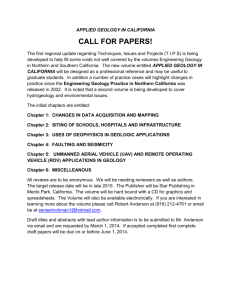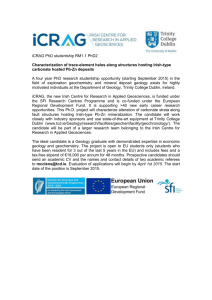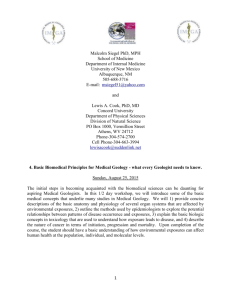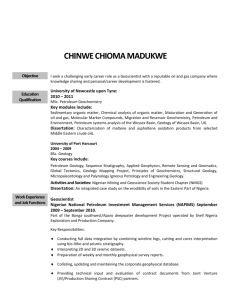persons responsible for collection
advertisement
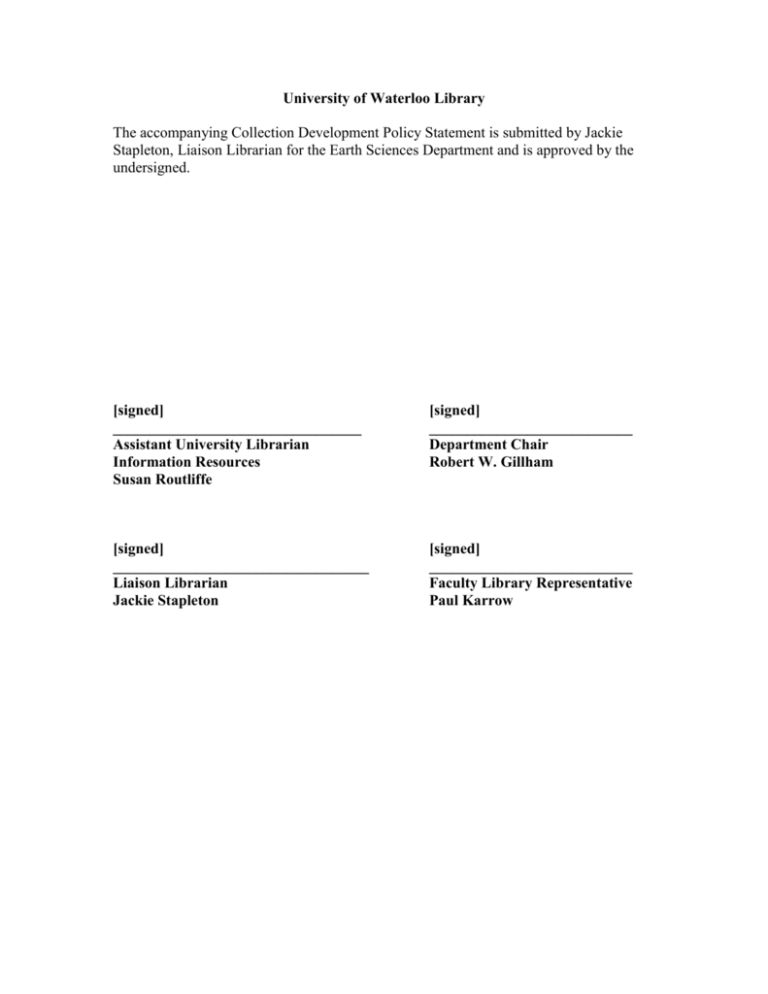
University of Waterloo Library The accompanying Collection Development Policy Statement is submitted by Jackie Stapleton, Liaison Librarian for the Earth Sciences Department and is approved by the undersigned. [signed] _________________________________ Assistant University Librarian Information Resources Susan Routliffe [signed] ___________________________ Department Chair Robert W. Gillham [signed] __________________________________ Liaison Librarian Jackie Stapleton [signed] ___________________________ Faculty Library Representative Paul Karrow UNIVERSITY OF WATERLOO COLLECTION DEVELOPMENT POLICY STATEMENT EARTH SCIENCES - 2006 PERSONS RESPONSIBLE FOR COLLECTION The selection of library materials for Earth Sciences is the responsibility of the Liaison Librarian, Jackie Stapleton, in consultation with the Faculty Library Representative, Paul Karrow. DEPARTMENT DESCRIPTION AND PURPOSE The major areas are in hydrogeology, groundwater modelling and remediation, aqueous, organic and isotope geochemistry, isotope hydrology, atmospheric science, economic geology, mineralogy, petrology, structural geology, engineering geology, geophysics, sedimentology and Quaternary geology. Some of the Department of Earth Sciences research groups include: Waterloo Institute for Groundwater Research (WIGR) Environmental Isotope Laboratory Hydrogeology Geochemistry & Remediation University Consortium Solvents-in-Groundwater Research Program Canadian Network for Isotopes in Precipitation Organic Geochemistry and Environmental Microbiology Laboratory Atmospheric Science SCOPE OF COVERAGE Language English language materials are preferred; however, major foreign language works may be purchased as required to meet special needs. Dates of Publication Much of the earth sciences literature remains useful for teaching and research regardless of its age. Even in subject areas where the material of interest in research is recent, some materials needed for teaching encompass the whole history of the subject. While there are no general chronological restrictions, emphasis is placed on materials published in the last 25 years. Geographical Areas The following geographical areas are listed in order of priority: North America Europe Arctic South America Oceans Asia Africa Australia Antarctica TYPES AND FORMATS OF MATERIALS COLLECTED In general, the Library does not acquire materials in a format for which access cannot be provided in the Library. Included The following types of materials are generally included: Books, periodicals, reference works, textbooks, symposia and conference proceedings, government publications, reports, transactions, field trip guidebooks and other publications of societies, associations and other non-governmental organizations. Excluded The following types/formats of materials are generally excluded: Films, videos, sound recordings, theses, reprints, patents, standards, and computer software. Maps and atlases are no longer held at the Davis Centre Library. These materials are collected by the Manager, University Map Library and Branch Library Services and housed in the University Map Library. Levels of Collecting 0. Out of Scope The library does not collect in this subject. 1. Minimal Information Level The collection supports minimal inquiries about this subject with a limited selection of monographs and reference works. 2. Basic Information Level The collection serves to introduce and define the subject. Only the most important reference works, general surveys, the most significant works of major authors, and a limited selection of representative general periodicals are collected. 3. Instructional Support Level The collection supports all courses of undergraduate study and master’s degree programmes. Materials collected include a wide range of reference works, fundamental bibliographic tools, and an extensive collection of monographs and periodicals. Access to owned or remotely-accessed electronic resources, including texts, journals, data sets, etc. is provided. 4. Research Level The collection includes major published source materials required for doctoral study and independent research in the subject. All formats, including appropriate foreign-language titles, are acquired. Historically important monographs, archival materials, and back-runs of serials are acquired as necessary. 5. Comprehensive Level The collection is exhaustive in its depth and scope. All relevant materials, in all formats and applicable languages, are retained and preserved. The collection may be recognised as a national resource. All collections should be systematically reviewed for currency of information and to ensure that essential and important resources are retained. Superseded editions and titles containing outdated information should be withdrawn as necessary. Classic retrospective materials should be retained and preserved to serve the needs of historical research. Subjects and Collecting Levels: Climatology 3 Economic geology/geochemistry Mineral deposits 4 4 Engineering geology Geotechnique Mine sites 4 4 4 Environmental geology Geologic hazards Volcanoes, earthquakes Slopes Karst Floods 4 4 3 4 4 3 General geology Marine geology Volcanology Structural geology and tectonics Extraterrestrial geology Historical geology Geothermal energy History of geology 4 4 2 4 3 4 3 3 Geochemistry Biogeochemistry 4 4 Environmental geochemistry Global change Isotopes Geochronology 4 4 4 3 Geology and health 3 Geomorphology Geolimnology Landform genesis and evolution Paleolimnology 4 4 4 4 Geophysics Geodesy Environmental geophysics Seismology 4 1 4 3 Hydrogeology Physical Chemical Remediation Modelling 4 4 4 4 4 Hydrology Climate change Groundwater-surface water interactions Surface water 4 4 4 3 Mineralogy Crystallography 3 2 Oceanography 2 Paleontology 3 Petrology 4 Quaternary studies Neotectonics Paleoecology Stratigraphy 4 3 4 4 Remote sensing and photogeology 2 Sedimentology/stratigraphy Petroleum geology 4 4 Soil science 3 OTHER RESOURCES AVAILABLE The Library continues to explore various initiatives from a TriUniversity Group and Ontario Council of University Libraries perspective. Other Collections The departments of Biology, Geography, Anthropology, Chemistry and Civil Engineering also collect in areas of interest related to Earth Sciences. In particular, Chemistry collects in the area of atmospheric sciences. The Earth Sciences collection policy will expand to include this area when research becomes more prominent among Earth Sciences faculty or undergraduate or graduate classes are taught in this field. Date of creation: April 2006
